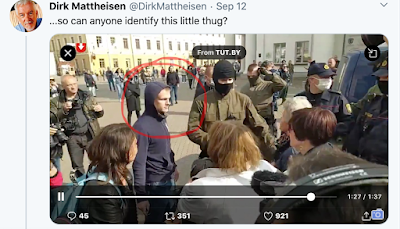The Financial Times (paywall) provides additional details about some of the largest banks mentioned, including Deutsche Bank, HSBC, and Barclay's. FT reports that, not only was Deutsche Bank fined $630m for laundering Russian money between 2012 and 2015, Bank of America was so worried about Deutsche Bank's poor due diligence that it filed a SAR against Deutsche Bank and raised their concerns directly with Deutsche Bank's CEO, Paul Achleitner. And, it is not just hot Russian money. HSBC was caught laundering money from Mexico and Hong Kong.
To make matters worse, it is not just about financial fraud. In a separate opinion piece in FT (paywall), "The Rise of the Foreign Funds That Distort Western Politics", Josh Rudolph with the Alliance for Securing Democracy at the US-German Marshall Fund, writes that the FinCEN files reveal "the husband of a big UK Conservative party donor" was funded by a Russian oligarch close to Russian President Putin. Rudolph enumerates occasions when foreign authoritarian leaders attempted to influence Western democratic processes through illicit money flows. He writes, "Covert Foreign money transforms the civic infrastructure of open societies into an asymmetric weapon, converting freedoms into methods of attack."
The FinCEN files should raise urgent alarms in the West. They provide abundant evidence of money laundering for the sake of money laundering that creates widespread corruption in the recipient countries not just in the countries of origin. The files also provide ample evidence, as Rudolph writes, of attempts to influence political processes in the US and Europe.
The ICIJ reports, "Years after concerns first emerged, banks continued to mover money for fraudsters, drug dealers and allegedly corrupt officials, leading to cases of real harm." Jodi Vittorie of the Transparency International's Defense and Security Program and a fellow at the Carnegie Endowment for International Peace describes the impact of money laundering this way, "People may not be aware of problems like money laundering and offshore businesses, but they feel the effects every day because these are what make large scale crimes pay, from opioids to arms trafficking and theft of Covid-19-related unemployment benefits" (INFOBAE via Marcelo Octavio de Jesus).
Although German authorities were quick to respond that the files did not reveal anything new, at least about Deutsche Bank, not enough has changed. The EU did pass in 2018 the 5th Anti-Money Laundering Directive that requires EU members to establish public registries of all companies and their beneficial owners. It also requires cooperation between banks and regulators among the EU countries in order to improve communication between law enforcement in different countries. But the files make clear that in the EU and the US the resources to combat money laundering are inadequate, as is frequently the political will. The US is a major destination of hot money because it has a deep financial market and is considered a safe haven, but more importantly, it has some of the most lenient corporate transparency laws, including no requirement to register beneficiary owners of corporations or for public disclosure of beneficiary ownership. The US has yet to pass legislation on transparency as the EU has done.
This needn't be the case. There are good examples of long-standing corporate transparency. Anders Aslund, well-known Swedish economist and a Senior Fellow at the Atlantic Council, makes the point "that not only tax returns but all property registries etc, have been public in Sweden and Finland since 1766, when Sweden adopted the first Freedom of Information Act in the world to expose the bribery of Russia and France to some top aristocrats. Denmark, then with Norway, followed in 1771. None of these four countries have ever gone back. Even when Finland was part of the Russian Empire (1809-1918), it maintained the Swedish freedom of information act. This is why these four countries are generally among the top half dozen least corrupt countries in the world. in Norway, all tax returns are available on the web."
While the EU has taken the right step in promoting transparency, the US needs to do so also. And, both the EU and US need the oversight and enforcement resources necessary to ensure adequate oversight and control of the vast illicit international financial flows that threaten to undermine Western democracy and the rule of law.
ICIJ is publishing a series of stories on the FinCEN files, which can be found here.










